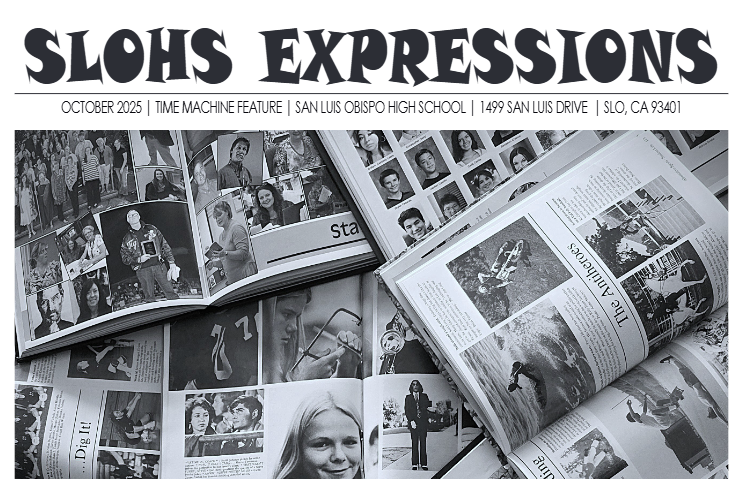The king of the audiobook industry. Graphic courtesy of reporter Fiona Spurlock.
The following SLOHS Expressions article was featured in the 2023 Nature Feature. The physical paper will be distributed to classrooms and is also featured on the Expressions website.
Audiobooks are just one of the many ways students at San Luis Obispo High School read. Of the many different services used to listen to audiobooks, Audible is by far the most popular. Audible spearheaded the audio revolution, making audiobooks accessible at a reasonable price; but the benefits for the consumers don’t translate to the independent authors trying to start a career.
Audible offers inexcusably low deals to the lesser-known authors, not paying them anywhere near a liveable wage whilst Amazon, a company worth over a trillion dollars, pockets the profits.
Audible pays independent authors forty percent of the profits from their books. That is nearly half of the seventy percent industry standard for digital products and even less than the fifty percent standard for physical copies of the same books. Audiobooks only need to be recorded once whilst printed books take time and money to make each book. Selling a physical book costs much more. Things like warehouse costs, employee costs, and paying for the storefront are some of the many fees, yet physical stores can afford to pay ten percent more. What’s worse, that already unlivable forty percent drops to 25 percent if the author refuses to be exclusive with Audible, furthering Audible’s monopoly.
“As for listening platforms I’m aware of, it’s mostly just Audible,” said freshman Lorelei Leinhos.
Despite Audible clearly making more than enough money to be profitable, Audible pays their authors based on the net sales; not how many books are listened to. With Audible’s no-questions-asked return policy, authors end up getting a little over half of the money they deserve. It costs authors and narrators thousands out of pocket just to produce the audiobooks and Audible doesn’t invest a cent.
“I buy all my books through [Amazon] because of the speed and easy access to it, which I do feel a bit guilty about because it does hurt the small-bookstore owner,” said English teacher Lynnly Sainsbury.
Many students are unaware that Audible is part of the Amazon conglomerate. Like all tech giants, Amazon’s growth strategy was to buy out potential rivals and simultaneously sell products below cost to prevent new companies from springing up faster than Amazon could buy them out.
A company as large as Amazon can afford to have malicious practices and no one leaves simply because of the convenience that’s being offered. It’s been known that Amazon mistreats warehouse workers, and that mistreatment extends to the authors and narrators that have nowhere else to turn due to the monopoly Audible holds upon Audiobooks.
Another shameful way Audible managed to hold its monopoly for so long is by the use of Digital Rights Management (DRM) on ebooks and audiobooks. In short, DRM is a kind of encryption that is marketed to creators and publishers as a way of preventing unauthorized copying, but instead, it simply prevents authorized use. It’s quite easy to illegally remove DRM, but the only way to legally remove it is by having it unlocked but only Amazon can unlock it. If an author decides to leave Amazon, only Amazon can give them permission to move their books to a rival platform.
Under Section 1201 of 1998’s Digital Millennium Copyright Act (DMCA), it is a felony to provide someone with a tool to remove DRM, even if no copyright infringement takes place. The penalty for someone’s first offense of violating DMCA 1201 is a five-year prison sentence and a $500,000 fine.
“It’s as if every book you bought at Walmart could only be stored on a Walmart bookcase, to be read in a Walmart chair, under a Walmart lightbulb, and if the author of the book gave you a tool to let you use someone else’s shelves, chair or bulb, Walmart could send that author to prison for five years, for letting them transfer the book they wrote, whose copyright they hold,” wrote concerned author, Cory Doctorow.
That analogy sounds outrageous because it is. Audible is being absurd with these rules. Authors are being abused and Audible isn’t hiding anything. Audible is outwardly one of the most corrupt companies out there, but no one can oppose them because of how strong Audible’s monopoly is. Companies like Spotify are trying hard to break Audible’s monopoly on audiobooks before it gets even more impenetrable, but hopes of their success are grim without the support of larger authors.
The most popular books right now tend to be from authors who have already created several other mainstream books. It’s difficult for a new author to make it big; independent authors can’t survive in today’s book market and Audible is one of the companies largely at fault. Audible feels the need to abuse its authority towards independent authors, destroying them financially before their stories reach the market.
The revolt against Audible isn’t some grand crusade; it’s a ramshackle group of concerned authors. Some larger authors are compassionate to newer authors, and some independent authors are fighting against Audible because it’s all they can do to feed their family and make a living. Not signing his audiobooks with Audible cost Doctorow a fully paid-off mortgage and fully funded college savings account for his daughter.
Audible Content Exchange (ACX) is a program that exploits these lesser-known independent authors along with the narrators for their audiobooks.
ACX is an Audible affiliated company that’s built to get authors and narrators together so they can record audiobooks to put on Audible. A seemingly wonderful idea until one takes a look at how hideous the company is. Unlike the authors and narrators, Audible/ACX makes no investment whatsoever on the audiobooks, making the sheer amount of ‘royalties’ taken absurd. On the website, ACX claims to put “users in the driver’s seat” as an excuse for not doing anything useful. Authors, narrators, and rights holders invest thousands of dollars in each audiobook produced, and yet the audiobooks are still treated as the property of Audible.
There are four primary services ACX actually offers:
First, they offer a matching service for narrators and authors. A service that’d be extraordinarily useful if the website was not riddled with ‘scam books’. Scam books are books that were written exclusively to waste the narrator’s time without ever actually being published. The narrator wastes time and money on a book that won’t create any profit.
Secondly, they offer a quality control service and approval of audio quality prior to the book being uploaded on Audible. Unfortunately, since 2019, the advertised four weeks have stretched to the book occasionally being approved nine months after being completed.
Third, Delivery of the book to Audible, Amazon, and the Apple Store. The only thing ACX does right. Profiting off others’ hard work.
Finally, they calculate and pay royalties to the authors. Audible commits fraud with its lenient return policy, and its opaque accounting statements, making it difficult to see if the minuscule amount they say their paying is even being paid.
#Audiblegate, a motion started by author Susan May, quickly picked up steam amongst concerned ACX users. It was one of the first movements against Audible’s corrupt ways of going about things. The original article was posted on November 1, 2020, and called out how Audible was essentially a rental scheme that didn’t pay the well-deserving authors and narrators. Audiblegate was one of the first defenses for ACX authors.
Audiblegate only really found its peak, although, when forensic accountant turned mystery thriller author, Colleen Cross wrote four well-researched blog posts about the truth behind Audible’s royalty calculations. Cross’s discoveries boosted AudibleGate into the faces of many other ACX authors; one of the crucial factors to uncovering Audible’s failure was Cross’s writing.
Even if a book isn’t sold directly to Audible, many books find their way to that platform regardless. Some authors recognize how disgusting Audible’s conditions are, and try to sell their books to other platforms such as Recorded Books, just to realize that one of their largest markets is Audible. If a reader recognizes Audible’s filth and flees to a company like Apple for their audiobooks, they’d be aghast to realize that many of Apple’s audiobooks come from Audible. In fact, after extensive research, the well-known author, Brandon Sanderson, only managed to find two listening platforms that weren’t going to sell his books to Audible after he gave it to them: Spotify and Speechify.
Audible’s monopoly reached far enough that only two unaffiliated companies could be found.
Audible is quick to offer free returns to its users. It’s a heavily promoted service of theirs labeled the Great Listen Guarantee (GLG). They use GLG in order to gain even more listeners and have consumers stay loyal to their service. This seems like a poor business plan, essentially giving books away for free, but the company is barely losing anything over this service. The overly-generous return policy takes money straight from the author’s pocket. Books are free to Audible so they can offer such egregious offers with absolutely no consequences. This practice and many other similarly malicious practices frequently done by Audible are only possible because of the monopoly Audible holds on Audiobooks. With no true competition, Audible has no reason to stop these practices that can make them seem like the better company. Who wouldn’t want to be able to refund books that they’ve already read and don’t plan on re-reading? GLG is used as a perpetual library-style exchange system that offers no money to authors as users keep re-using their one credit.
The most valuable asset Audible holds is a tight grip on writers and listeners alike. What Audible fears more than anything else is competition. Without that lock-in on customers, the profits from every sleazy trick would have to be weighed against the losses from writers and listeners leaving the platform in disgust. Authors like Doctorow and Sanderson are withholding books from Audibles unrelenting capitalistic grasp and instead offering them to other, audiobook platforms, slowly diminishing the choke-hold Audible has on the audiobook industry. If enough authors put principals over their wallets and withhold their novels for those who can’t afford to, the chains of dreadful DRM contracts can be escaped for good.
Without competition, Audible is marching its way to a slow corporate death as it smothers all independent authors out of the field, narrowing the publishing industry until its only older authors left, no new talent or ideas being put into a field that’s built upon creativity.
Take into consideration the authors that painstakingly work to write such excellent novels before choosing what platform to listen to audiobooks on.
Sources: brandonsanderson.com, audiblegate.com, selfpublishingadvice.org, yalelawjournal.org, pluralistic.net, susanmaywriter.net, youtube.com































